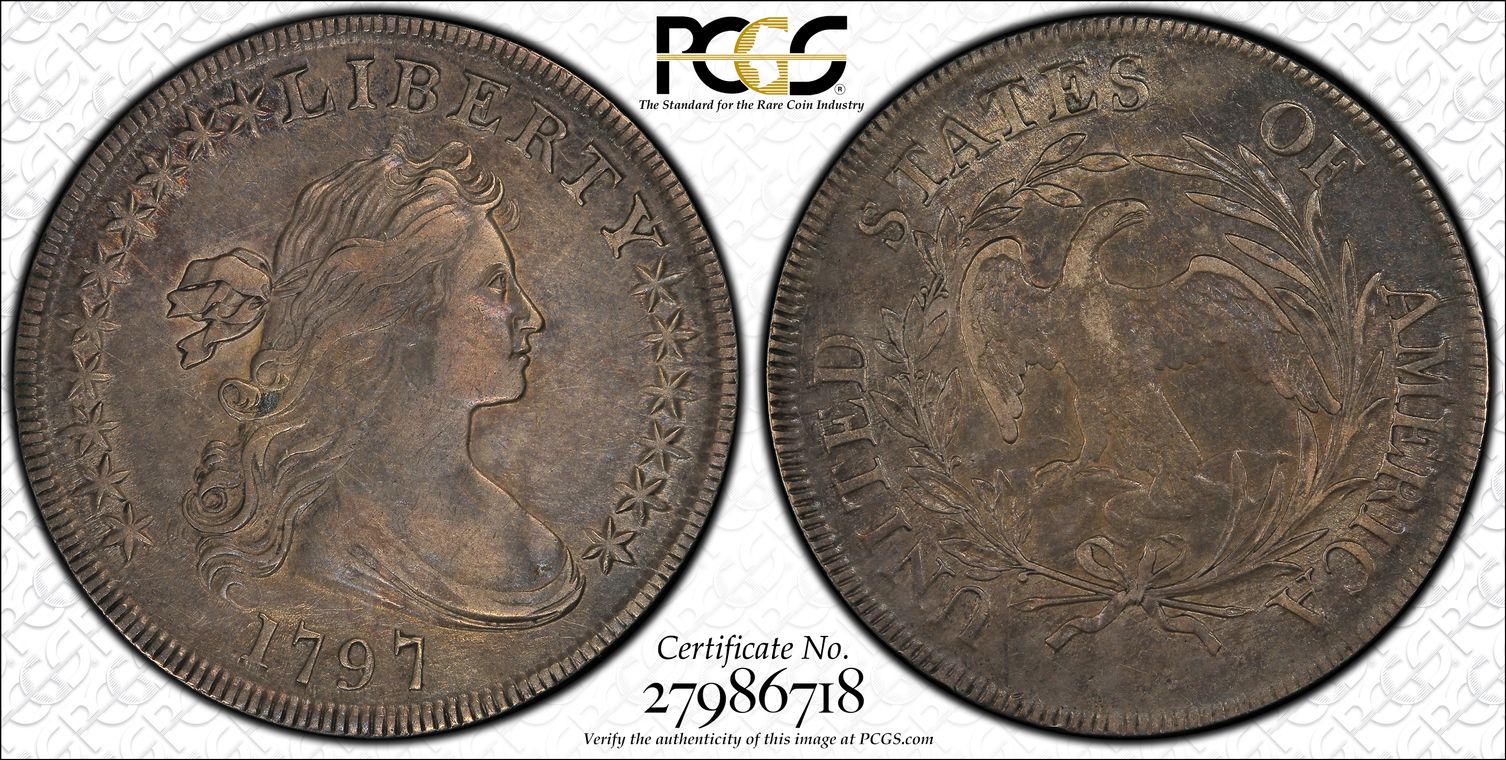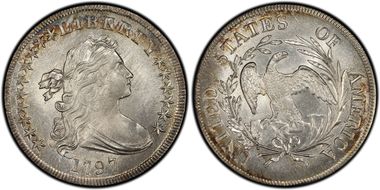1797 $1 BB-71 XF45 认证号27986718, PCGS号40004
专家评论
Q. David Bowers
The following narrative, with minor editing, is from my "Silver Dollars & Trade Dollars of the United States: A Complete Encyclopedia" (Wolfeboro, NH: Bowers and Merena Galleries, Inc., 1993). Note: the Notable Specimens list should be used with caution - it has been updated in my 2013 edition of "The Encyclopedia of United States Silver Dollars 1794-1804."B-3. H-3.
OBVERSE 1: 16 stars, only six at right facing bust. A die dot close to the bottom right of the second digit makes the date read 1797 (some imagination is required); the last 7 is high. The star arrangement of 10 stars to the left and six to the right is unique in the dollar series.
Obverse die used to strike 1797 BB-71 only.
REVERSE A: Large letters in legend. 8 berries in left branch. Leaf ends under middle of E in STATES. Lowest berry near ribbon bow is on outside of wreath. Large planchet. A leaf is almost below the T in UNITED, a berry is under the center of the first T in STATES, another leaf is past the 0 in OF and another leaf is very close to the R in AMERICA. Three leaves below eagle's right (observer's left) wing.
Reverse die used to strike 1797 BB-71 only.
DIE STATES:
Die State I: Obverse and reverse die perfect; neither relapped. Obverse shows the highest wave of hair fully impressed in the die, stars perfect. May not exist.
Die State II: Obverse die relapped. Highest wave of hair, under upright of B, is incomplete. Stars appear spidery and imperfect. Stars 9 and 10 have the innermost points shortened. Slightly scarcer than the following.
Die State III: Obverse die relapped as above. Reverse relapped, removing the right edges of several palm leaves on the right side of the branch. The die state usually seen.
Die State IV: Die crack develops on and just below right foot of first A in AMERICA, and on right edge of palm leaf under center of that A. Very rare.
COLLECTING NOTES: 1797 BB-71 is about tied with BB-73 in terms of availability. I estimate that 1,250 to 2,000 are known. If anything, BB-71 is very slightly scarcer than BB-73.
As is the case with dollars of the two other varieties of this year, examples of 1797 BB-71 are usually seen in lower grades. However, several have been called Uncirculated over the years. Undoubtedly, most would not merit the grade by today's stricter interpretations of standards. However, any 1797 dollar that is a candidate for being in this grade is apt to be of the BB-71 variety. In October 1990, Superior sold a coin certified as NGC MS-64, which may be the finest known. Specimens are seen on large or slightly smaller planchets. The large-planchet coins have the obverse denticles especially boldly defined. Those on smaller planchets have narrower rims.
NOTABLE SPECIMENS:
October Sale Specimen. MS-64 (NGC) . Superior, October Sale, 1990: 3715. "Outstanding strike, surfaces, lustre and color. All stars are complete around Liberty, while all but the central detail on her rolling curls are as keen as a knife edge. Drapery around her frontal prominence is also nearly completely defined, showing clear separation from shoulder to curve. On the reverse, the wreath is complete throughout, and is so sharply defined. Every feather on the eagle is razor sharp, and shows silvery lustre on top and within."
Newman Specimen, MS-63. Eric P. Newman Numismatic Education Society. Brilliant lustre with pale blue and gold peripheral toning.
Auction '86 Specimen. MS-63. Rarcoa, Auction '86, 1986: 727. "Well struck Choice Brilliant Uncirculated, with surfaced enhanced by the lightest essence of pale golden toning."
Austin Specimen. MS-63. Bowers and Ruddy, 1974: 16. "Choice Brilliant Uncirculated. A few normal adjustment marks. Simply fantastic." Kensington Collection, Bowers' and Ruddy, 1975: 1214.
Carnegie Institute Specimen; MS-63. Spink's Carnegie Institute Sale, 1982. The London firm of Spink & Son, Ltd. handled the Carnegie Institute (Pittsburgh) coins on the advice of their advisor, Lester Merkin .Jascha Heifetz Collection, Superior, 1989: 2390. "Irregular toning of midnight blue, gold, and russet about obverse and reverse. The dies were well worn when this coin was struck making the reeding weak in. areas. The eagle's breast feathers are almost complete, thigh feathers are a bit flat. Minor adjustment marks noted about reverse rim."
Baldenhofer Specimen. MS-60+. W.G. Baldenh6fer Collection; Farish-Baldenhofer Sale, Stack's. AJ. Ostheimer, Srd Collection .' Gilhousen Collection, Superior, 1973: 1227. "Warmly toned Uncirculated, a number of reverse scratches on eagle. Well struck, frosty and beautiful." ANA Convention Sale, Superior, 1975: 843.; Auction '85,
Superior, 1985: 823. MS-60+.
Cleneay Specimen. MS-60. Thomas Cleneay (Chapman brothers, 1890), Uncirculated.
Mills Specimen; MS-60. John G. Mills (Chapman brothers, 1904), Uncirculated.
Gable Specimen. MS-60. William F. Gable (S.H. Chapman, 1914), Uncirculated.
Golding Specimen. MS-60. Golding Collection, Stack's, 1952: 221. Harold Bareford Collection, Stack's, 1981: 410. "Brilliant Uncirculated, frosty lustre. A touch of friction on high points. An unusually bold strike with full hair detail. Light toning about the periphery."
DeCoppet Specimen. MS-60. James Kelly, Andre DeCoppet Collection, 1955. "Strictly Uncirculated, original lustre and beautifully toned."
Robison Specimen. MS-60. Ellis H. Robison Collection, Part II, Stack's, 1982: 823. "Brilliant Uncirculated, the usual soft strike in central portion but very nearly full feathers. Frosty mint lustre with a soft satiny surface. Delicate russet and iridescent toning."
Spies Specimen. MS-60. Stack's, W. Earl Spies Collection, 1974: 36. "Uncirculated, full frosty mint lustre. Natural sea green, golden and iridescent toning, just a touch of friction on the cheek."
Wolfson Specimen. MS-60. Stack's, Louis Wolfson Collection, 1963: 1374. "Brilliant Uncirculated, full mint bloom, superb iridescent steel blue toning. Usual weak strike in center of coin."
Smith Specimen. AU-58. Elliot Smith Collection, J.C. Morgenthau & Co., T. James Clarke Collection, New Netherlands 48th Sale, 1956: 620. "Only a hair's breadth from full Uncirculated. Not fully struck up at center upon either side; Liberty's drapery at shoulder and bust point weak, not rubbed, and eagle weak except at wings. Nicely centered, dulled lustre and blue-brown tarnish." AJ. Ostheimer, 3rd Collection, Lester Merkin, 1968: 243. "Blue and brown toned choice Uncirculated. Parts of face, drapery and eagle not well struck up but showing mint frost, the remainder needle sharp. Tiny spots and streaks, evidently in planchet before striking; minute bagmarks."
Ron Guth
The obverse of all 1797 Silver Dollars contains 16 stars, representing the thirteen original colonies (now states), plus the new states that were added after the country was formed. The stars appear in either of two formats: 10 on the left side and 6 on the right, or 9 on the left and 7 on the right. Only one die variety (B-3, BB-71) comprises the entirety of the 10x6 format, and the 10x6 version is approximately twice as rare as the 9x7.
Each of the top ten examples of this variety is Mint State, starting at MS61 and going up to NGC MS65. The record price for this variety was set by the PCGS MS64 ex Col. Green coin that now resides in the Bruce Morelan Collection. In an interview with PCGS in 2016, Bruce spoke about this example: “The 1797 is from the Newman Collection. When the Newman Collection was for sale, Laura and I personally examined each one of the coins. We identified five of his coins that we thought were the best examples that we'd seen for the date. The 1797 was extremely well struck, great luster. A beautiful coin and the finest that I've seen for the date.”























